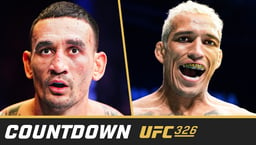
Issue 106
October 2013
Mario Yamasaki An MMA referee for 12 years, Mario has black belts in judo and BJJ. Each issue he discusses the hottest topics in the sport through the eyes of an official
Even for referees, pre-fight nerves are a good thing. It proves you’re focused and you care about your actions
Every referee entering the ring or Octagon has, at some point, had to deal with fear. Perhaps it’s the fear of the unknown, or fear of failure. You wonder if you have what it takes to be able to make the right decisions when called to do so.
Of course, it isn’t just referees who go through this. Everyone who has to step foot inside the cage must undergo their own issues with doubt and uncertainty. The MMA industry is full of catchy slogans about true warriors who have eliminated all fear. Absence of fear is a badge of honor in our industry.
However, studies have proven that some fear might actually be a good thing, and shouldn’t be entirely eliminated from your senses. To be clear, when I talk about fear, what I am really talking about as a referee is about stimulation: stimulation in terms of adrenaline that enters your system during an event.
Let me paint a picture of how this stimulation of adrenaline starts to develop. For those of you who have had the responsibility of being an official, this might seem familiar. Try to visualize this:
As a referee you enter the venue long before anyone else arrives and, while it’s quiet and empty now, it won’t be for long. With only the media crews setting up in the cold dark expanse for company, you do a customary walk around the cage and inspect it for problems. You may even do some quick visualization techniques inside the empty cage, which is always beneficial.
As the crowds start to arrive, you head backstage to get your assignments from the commission. Reviewing your assigned match-ups is when reality really kicks in. Perhaps you have the main event tonight – just in case you didn’t feel the pressure of responsibility enough.
Soon the fighters arrive so you head to the dressing rooms to go over the prefight instructions and the rules. You want to be sharp and in control when dealing with both the fighters and their corners. You are being judged on how you handle yourself. If something goes wrong, you are going to get blamed by everyone. Nobody wants to be blamed. So, again, the nerves jump up a notch.
Soon enough the event starts and the building is packed. The roar of the crowd, the lights, the music, and the announcements – there’s a lot happening. You sit at cageside, waiting for your turn. Your mind starts to wander, and you feel your heart rate slowly increase. You take a few more deep breaths and try to calm yourself. Then Bruce Buffer says, ‘It’s time!’
For anyone who is a referee, and especially anyone new to the industry, the scenario I’ve described is common. Anytime during this scenario you have a chance of letting your emotions get the better of you. However, a good referee overcomes this.
Eventually, referees develop strategies to keep their stimulation levels in check. I’ve talked about some of these strategies in past articles, and I will devote future articles to this as well. However, what I want to discuss is something that rarely gets talked about and that’s the polar opposite: becoming desensitized. As some stimulation and adrenaline is actually a good thing.
Frank Sinatra once told Tony Bennett he always got nervous before his shows. This was coming from one of the greatest performers of all time. In fact, Sinatra stated he needed to be nervous. It actually helped him. A bit of nervousness means you actually care about your performance. It means you have put some thought into how you will perform.
Studies indicate there is an optimal stimulation level, and that some stimulation or adrenaline might actually be beneficial. This stimulation level falls actually in the middle of the spectrum from being extremely relaxed to being extremely ‘jacked up’ and heavily stimulated. Both extremes are not good for referees or for athletes.
If you are overly nervous then you are overly stimulated and your performance is going to suffer as well. The trick as a referee – just like a fighter – is to find that space in the middle and keep it there during the fight.
I still get a bit nervous before every show. However, that’s where I have the edge. The adrenaline I feel actually enhances my skills and my abilities because it causes me to think and go over how I will react and perform during the event. I keep my emotions under control but always allow some adrenaline in.










